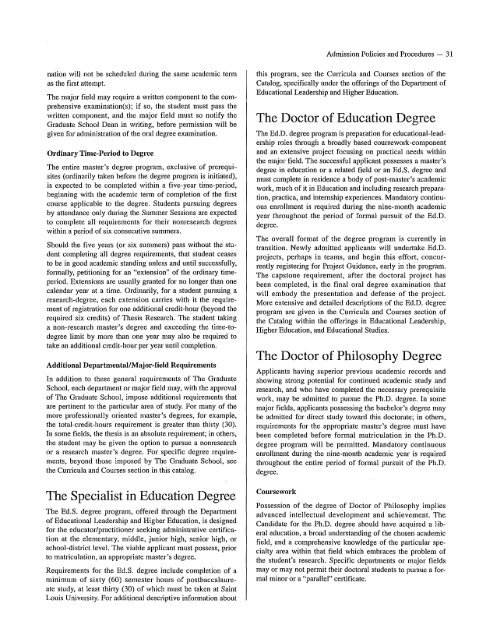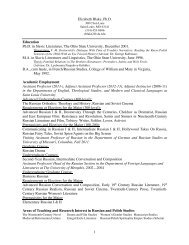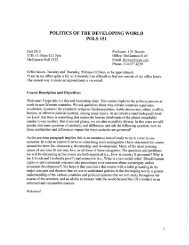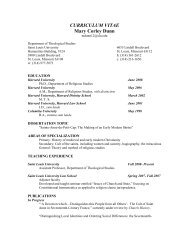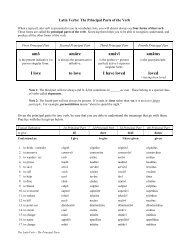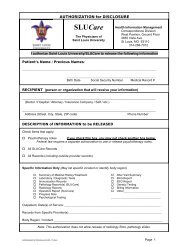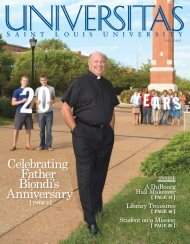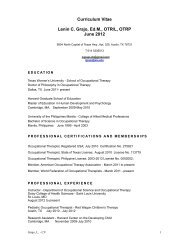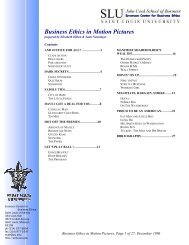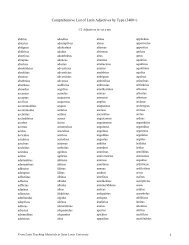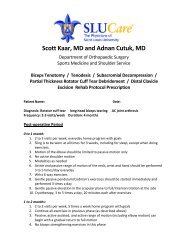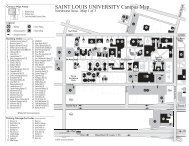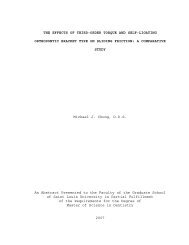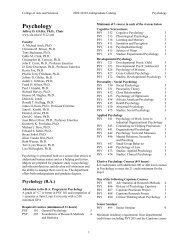Program Manual - Saint Louis University
Program Manual - Saint Louis University
Program Manual - Saint Louis University
Create successful ePaper yourself
Turn your PDF publications into a flip-book with our unique Google optimized e-Paper software.
nation will not be scheduled during the same academic term<br />
as the first attempt.<br />
The major field may require a written component to the comprehensive<br />
examination(s); if so, the student must pass the<br />
written component, and the major field must so notify the<br />
Graduate School Dean in writing, before permission will be<br />
given for administration of the oral degree examination.<br />
Ordinary Time·Period to Degree<br />
The entire master's degree program, exclusive of prerequisites<br />
(ordinarily taken before the degree program is initiated).<br />
is expected to be completed within a five-year time-period,<br />
beginning with the academic term of completion of the first<br />
course applicable to the degree. Students pursuing degrees<br />
by attendance only during the Summer Sessions are expected<br />
to complete all requirements for their nonresearch degrees<br />
within a period of six consecutive summers.<br />
Should the five years (or six summers) pass without the student<br />
completing all degree requirements, that student ceases<br />
to be in good academic standing unless and until successfully,<br />
formally, petitioning for an "extension" of the ordinary timeperiod.<br />
Extensions are usually granted for no longer than one<br />
calendar year at a time. Ordinarily, for a student pursuing a<br />
research-degree. each extension carries with it the requirement<br />
of registration for one additional credit-hour (beyond the<br />
required six credits) of Thesis Research. The student taking<br />
a non-research master's degree and exceeding the time-todegree<br />
limit by more than one year may also be required to<br />
take an additional credit-hour per year until completion.<br />
Additional Departmental/Major-field Requirements<br />
In addition to these general requirements of The Graduate<br />
School, each department or major field may, with the approval<br />
of The Graduate School, impose additional requirements that<br />
m·e pertinent to the particular area of study. For many of the<br />
more professionally oriented master's degrees, for example,<br />
the total-credit-hours requirement is greater than thirty (30).<br />
In some fields, the thesis is an absolute requirement; in others,<br />
the student may be given the option to pursue a nonresearch<br />
or a research master's degree. For specific degree requirements,<br />
beyond those imposed by The Graduate School, see<br />
the Curricula and Courses section in this catalog.<br />
The Specialist in Education Degree<br />
The Ed.S. degree program, offered through the Department<br />
of Educational Leadership and Higher Education, is designed<br />
for the educator/practitioner seeking administrative certification<br />
at the elementary, middle, junior high, senior high, or<br />
school-district level. The viable applicant must possess, prior<br />
to matriculation, an appropriate master's degree.<br />
Requirements for the Ed.S. degree include completion of a<br />
minimum of sixty (60) semester hours of postbaccalaureate<br />
study, at least thiity (30) of which must be taken at <strong>Saint</strong><br />
<strong>Louis</strong> <strong>University</strong>. For additional descriptive information about<br />
Admission Policies and Procedures - 31<br />
this program, see the Curricula and Courses section of the<br />
Catalog, specifically under the offerings of the Department of<br />
Educational Leadership and Higher Education.<br />
The Doctor of Education Degree<br />
The Ed.D. degree program is preparation for educational-leadership<br />
roles through a broadly based course work-component<br />
and an extensive project focusing on practical needs within<br />
the major field. The successful applicant possesses a master's<br />
degree in education or a related field or an Ed.S. degree and<br />
must complete in residence a body of post-master's academic<br />
work, much of it in Education and including research prepm·alion,<br />
practica, and internship experiences. Mandatory continuous<br />
enrollment is required during the nine-month academic<br />
year throughout the period of formal pursuit of the Ed.D.<br />
degree.<br />
The overall format of the degree program is currently in<br />
transition. Newly admitted applicants will undertake Ed.D.<br />
projects, perhaps in teams, and begin this effort, concurrently<br />
registering for Project Guidance, early in the program.<br />
The capstone requirement, after the doctoral project has<br />
been completed, is the final oral degree examination that<br />
will embody the presentation and defense of the project.<br />
More extensive and detailed descriptions of the Ed.D. degree<br />
program are given in the Curricula and Courses section of<br />
the Catalog within the offerings in Educational Leadership,<br />
Higher Education, and Educational Studies.<br />
The Doctor of Philosophy Degree<br />
Applicants having superior previous academic records and<br />
showing strong potential for continued academic study and<br />
research. and who have completed the necessary prerequisite<br />
work, may be admitted to pursue the Ph.D. degree. In some<br />
major fields, applicants possessing the bachelor's degree may<br />
be admitted for direct study towm·d this doctorate; in others.<br />
requirements for the appropriate master's degree must have<br />
been completed before formal matriculation in the Ph.D.<br />
degree program will be permitted. Mandatory continuous<br />
enrollment during the nine-month academic year is required<br />
throughout the entire period of formal pursuit of the Ph.D.<br />
degree.<br />
Coursework<br />
Possession of the degree of Doctor of Philosophy implies<br />
advanced intellectual development and achievement. The<br />
Candidate for the Ph.D. degree should have acquired a liberal<br />
education, a broad understanding of the chosen academic<br />
field, and a comprehensive knowledge of the particular specialty<br />
area within that field which embraces the problem of<br />
the student's research. Specific departments or major fields<br />
mayor may not permit their doctoral students to pursue a formal<br />
minor or a "parallel" certificate.


